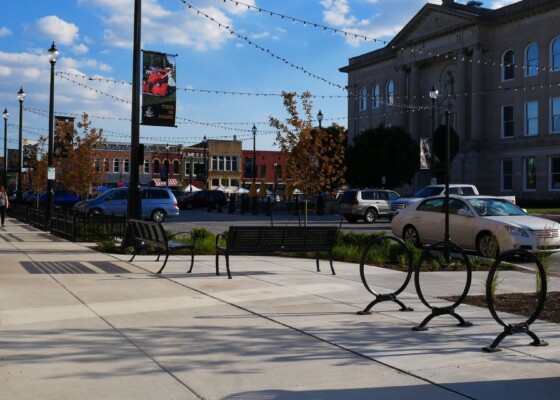Get Ready to Trek and Talk, Hoosiers!
March 30, 2016This time of year, when trees are leafing out, the days are growing longer and flowers start blooming, Hoosiers are extra eager to spend time outside. In 2016, as we…
This time of year, when trees are leafing out, the days are growing longer and flowers start blooming, Hoosiers are extra eager to spend time outside. In 2016, as we celebrate our state’s 200th birthday, our sense of the specialness and beauty of Indiana’s wild places will be especially acute.
What better time to launch Next Indiana Campfires, a new program that connects nature, literature and the Indiana Bicentennial? Long in the works, registration for this statewide series of hikes, canoe trips and bike rides is finally open. I’m so excited to share a little about its genesis, the big ideas we’ll explore and the once-in-a-lifetime programs we’ve planned.
We first dreamed up this project in spring of 2015, when we had a chance to apply for special funding related to the 100th anniversary of the Pulitzer Prize. In doing our homework, we discovered that one of Indiana’s Pulitzer winners is Edwin Way Teale, a significant and influential mid-century nature writer. His memoir Dune Boy recounts his experiences on Lone Oak Farm in Indiana’s scenic and precious lakeshore dunes. Like Henry David Thoreau and John Muir, to whom he is often compared, his writings have awakened an environmental consciousness in generations of readers.
Teale is one of many Hoosiers who’ve made significant contributions to the canon of American environmental literature and thought. Though this genre is most often associated with the West, people like Gene Stratton-Porter, Theodore Dreiser, Scott Russell Sanders, Etheridge Knight and Teale have written lyrically and influentially about humans’ relationship to nature as well as helped to define a sense of place rooted in the Hoosier landscape.
Upon digging into these authors, a vision started to unfold: what if Indiana Humanities took Hoosiers out on the trail to read outstanding writing on nature and conservation? Would reading descriptions of the landscape while trekking through Indiana’s wild places create a deeper understanding of the texts? Could these indelible experiences motivate us learn about the long history of Hoosier stewardship, and get us to think and talk about what legacies we’ll leave to future generations?
Thus was born Next Indiana Campfires. The program combines a pretty traditional public humanities method, scholar-led text-based discussion, with an unexpected (at least for us indoor kids!) format, on-the-trail readings and campfire discussions. We hope this unusual combination inspires Hoosiers to check out new places and to consider new points of view (thanks to Upland Brewing Co., we’ll be able to enjoy a few beers to help get the conversation flowing.
Of course, we couldn’t pull off such an ambitious and wacky statewide series without the enthusiasm, creativity and know-how of our partner organizations. Each experience will be unique thanks to their suggestions and expertise. I can hardly contain my excitement about some of the programs we’ve cooked up for you; here are a few of my favorites:
- A walk through Indiana’s largest grove of old growth forest with Wesselman Nature Society (May 22 in Evansville)
- An epic summer hike across the Indiana Dunes with the Dunes Learning Center (June 18 in Porter)
- An overnight camping trip (no experience necessary!) in Morgan-Monroe State Forest with the gutsy lady outfitters DNK Presents (July 9-10 in Morgan County)
- A Friday night paddle and campfire at Eagle Creek Reservoir (July 29 in Indianapolis)
- A late afternoon bike ride and prairie walk along the Cardinal Greenway with Red-tail Land Conservancy (August 14 near Muncie)
- A sunset paddle through the nation’s northernmost stand of bald cypress trees, followed by discussion under the stars at Hovey Lake (September 17 in Posey County)
- A trip by long canoe (yes, like Native Americans and early trappers used!) with the good folks of the Trail Creek Partnership (October 8 in Michigan City)
- A sunset trek through the restored Lobolly Marsh that so inspired Gene Stratton-Porter (October 8 in Geneva)
I didn’t even get a chance to tell you about the farm-to-table campfire meal we’ll enjoy in Goshen, the council house discussion we’ll have at Prophetstown or the sunset walk we’ll enjoy around Syracuse Lake! Head over to the main Campfires page to see all the offerings, and check back often as more are added in the coming weeks.
For those who can’t join us on one of our scheduled hikes, we’ve created “Trek and Talk” Toolkits, which contain everything you need to create a DIY Campfires excursion: text, discussion questions, suggested itineraries, a Next Indiana Campfires patch, and even a snack! We’ve ordered up 1,000; request one here, then hit the trail with your friends and family.
I’ll sign off by noting that this is just the first of a series of posts exploring the themes and ideas of Next Indiana Campfires. Check back on Tuesdays to discover writers, learn the history of Hoosier stewardship, meet the humanities scholars who will be leading the outings and more.
Can’t wait to see you on the trail, Hoosiers!
This post was written by Leah Nahmias, director of programs and community engagement.
—————————————————-
Next Indiana Campfires is a unique way to connect nature, literature and Indiana’s Bicentennial. The program is supported by the Efroymson Family Fund, Nina Mason Pulliam Charitable Trust and Pulitzer Prizes Centennial Campfires. Indiana Humanities is supported in part by Lilly Endowment Inc. and the National Endowment of the Humanities.

